What are the signs of an emotionally abusive relationship? People caught in toxic romantic relationships often find themselves pondering over this question, as they struggle to make sense of their own reality. While all relationship issues can take their toll, emotional abuse can be debilitating and crushing, for the person who is going through it as well as their family members and loved ones.
It can’t be stressed enough how badly being in a relationship where you experience emotional abuse can diminish the victim’s perception of self-worth and traumatize their psyche. The dynamics of such relationships are made more precarious by the fact that those trapped in such a relationship often fail to spot and recognize the early warning signs. Victims of such abuse and manipulation stay trapped in this endless cycle unless they muster the courage to walk out.
In this article, Anushtha Mishra (M.Sc. in Counseling Psychology) who specializes in trauma, relationship issues, depression, anxiety, grief, and loneliness explains what emotional abuse is, how to identify red flags indicating emotionally toxic relationships, and what you can do if you are in one.
What Is Emotional Abuse?
Table of Contents
So, what does emotional abuse look like? Emotional abuse is a pattern of behaviors where one person harms another person’s mental well-being and ability to function. It can happen in any relationship, such as between romantic partners, parents, children, friends, or coworkers. Emotional abuse may not leave any bruises or scars like physical abuse can, but it hurts just the same and takes many forms.
Research has shown that experiencing emotional abuse can have serious and lasting effects on a person’s mental and physical health. Emotional abuse signs and symptoms include,
- Low self-esteem
- Feeling worthless
- Hopelessness
- Being fearful
Its long-term effects can be,
- Depression
- Anxiety
- Post-traumatic stress disorder (PTSD)
- Substance abuse
- Suicidal thoughts
- Abandonment issues
- Chronic pain
Emotional abuse can affect the way a person interacts with others, such as their family, friends, or coworkers. It can also affect how a person performs at work, school, or other activities, and damage a person’s sense of identity and self-worth.
Symptoms of emotional abuse or emotional abuse, in general, include
- Being subjected to nasty words, mean looks, cold shoulders, scary threats,
- Feeling lonely and cornered
- Bossy orders
- Sneaky tricks
- Character assassination
- Cold dumps
- Name-calling
- Emotional blackmailing
- Mind games
20 Signs You Are In An Emotionally Abusive Relationship
Most people, especially young adults who are trapped in a relationship where there are signs of emotional abuse cannot fathom their partner’s behavior. They cannot read the signs of a relationship that can potentially be abusive. But it’s important to keep an eye out for any out-of-the-ordinary or borderline toxic behavior patterns right from the beginning. What seems like love at first can actually manifest into something very sinister that can completely change not just your entire relationship but also take a toll on your mental health. Experiencing abuse has effects on your physical health as well.
If you’re dealing with a controlling spouse, a manipulative partner, or a relationship that is taxing on your mental health, don’t remain in denial, passing them off as signs of love, care, concern, and possessiveness. Watch out for these signs of an emotionally abusive relationship and abusive behavior.
1. You try too hard to please your partner
Do you wonder what does emotional abuse look like? It’s when you are constantly extra cautious about not doing or saying anything that might trigger a negative response in your partner. Being a victim of emotional abuse simply means walking on eggshells – where you don’t know which action, direct or indirect, from your end can cause an emotional backlash or even physical abuse. Even a seemingly trivial matter can cause relationship arguments and you are always put on the wrong side.
2. Your partner’s opinions are to be respected, but yours are ridiculed
Toxic relationships are imbalanced in nature. Emotional abuse from spouse/partner is reflected in your inability to freely express your thoughts and opinions. If your partner feels it’s okay for them to rant on occasion yet your negative emotions make you a subject of their criticism, or if your partner dismisses your opinions in front of friends and makes you the butt of their joke, then these are definitive signs that your relationship is far from healthy.
3. You are a victim of gaslighting
You cannot define emotional abuse without talking about gaslighting. For the unversed, gaslighting is a form of emotional and psychological abuse which aims at denying someone’s reality and experiences and manipulating them to such an extent that they begin to doubt their own sanity and are riddled with self-doubt.
It’s a type of covert emotional abuse in a relationship that slowly eats your sense of judgment and fills you up with a sense of self-loathing. A manipulative partner may use gaslighting phrases such as,
- “I don’t remember that happening”
- “You’re imagining things”
- “I would never lie to you”
- “You’re just trying to make me look bad”
- “I didn’t mean it like that”
- “I did it because I care about you”
These are some examples of emotional abuse from a partner and if you find your partner saying any of these to you too often, then it is a dangerous sign of abuse and is often used to gain power and control over you.
4. Emotional abusers don’t trust your emotions
Complete trust in each other is at the very foundation of a good relationship. But in emotionally manipulative relationships, often the abusive partner is unable to trust their significant other because of low self-esteem. In a case like this, your emotions become an affront to them, which eventually turns into emotional abuse.
Due to a lack of trust in the partnership, they assume any expression of displeasure from your end is designed to hurt them personally. The abuser, in this case, sets off an emotional backlash, or in a worse scenario, may even try to physically hurt you. This is what experiencing emotional abuse feels like.
Related Reading: How does the abuser operate in an abusive relationship?
5. You feel isolated and trapped
Are you asking yourself repeatedly, “Am I being emotionally abused?” If you feel trapped, then it is one of the symptoms of emotional abuse. A mentally violent relationship thrives on isolating the victim from the world. Abusive people might try to dress up this need to “have you all to them” as romance, but by doing so, the abuser actually isolates you from friends and family. The same family member and loved ones who care about you – or anyone who could help you or offer support.
Being in a relationship that is characterized by emotional abuse makes you feel trapped as the abuser turns to intimidation or emotional blackmail to constrict your circle of people, making you avoid engaging with them. The abuser wants you to think that you are powerless and isolated, so they convince you that there is nothing you can do, nowhere you can go, and nobody you can trust, except them.
6. Unhealthy jealousy
Some jealousy in a relationship is normal but unhealthy jealousy, which is a sign of possessiveness, insecurity, and a lack of trust, can have dire consequences. This is true not just for the relationship but also for the partner at the receiving end. If you have stopped interacting with friends from the opposite sex, if you keep looking over your shoulders at the party when someone talks to you warmly, or if your partner sees red when someone comes and gives you a mere hug, then you are the victim of unhealthy jealousy.
One of the signs of emotional abuse from spouse/partner is when they are constantly on your case about who you hang out with and meet and are angered by even the remotest hint of resistance to their unreasonable demands from your end. This results in relentless fights and undue surveillance. Don’t let them get away with this behavior in the name of possessiveness or care. It’s time to start setting some boundaries.
7. The mood swings are harsh and unpredictable
Everyone has mood swings now and then. It’s only normal. But when you are in a mentally tortuous relationship, the mood swings are bound to catch you off guard. Things such as coming home with a sense of trepidation after buying something for yourself because your partner could react to it most unpredictably, or they switch from being supportive and encouraging to being dismissive and undermining of you are among the signs that you’re being emotionally abused.
Your partner could go over the moon seeing the dress you bought, tell you to wear it immediately or they could scream, shout or even slap you for splurging on a dress they believe you did not need. You don’t know which side their mood would swing and you are always on tenterhooks about that.
Related Reading: Dear Men, This Is The ‘Right Way’ To Handle Your Woman’s Mood Swings
8. They will criticize and shame you, but the tables can’t turn
Mental abuse in a relationship often takes the form of constant criticism. Criticizing you becomes your partner’s second nature. From what you wear to how you walk, how you talk, what kind of friends you have, your family, and your work – nothing escapes their criticism, and the purpose here is to make you feel ashamed.
However, you can’t dare tell them that they are wearing a wrinkled shirt and they should probably change it before heading to work. One of the signs of an emotionally abusive person is that they are never open to any kind of criticism or opinion from your end. They always have to be right and have the last word in any argument or disagreement, and never admit their faults or apologize.
9. Gives you the silent treatment
Couples fighting and not talking to each other for a day or two is okay and a part of a normal conflict. In fact, silent treatment could benefit the relationship, in this case, as it allows you to process your feelings and then have an open dialogue. But if someone gives you the silent treatment and ignores you for days on end, then it is nothing but a kind of emotional abuse.
The abuser builds a wall and wouldn’t let you penetrate it because they want to punish you. They start to act like you don’t exist or matter to them, and show no interest in your feelings, thoughts, or needs. This kind of stonewalling is the worst kind of abuse a person could be subjected to. You might have an emotionally abusive husband/wife/partner if they refuse to communicate with you in the wake of a conflict until you’re ready to give in and toe the line they want you to.

10. Says “I love you” too many times aka love bombs you
Initially, it might feel wonderful when your partner starts the day and ends it with an “I love you”, uttering it at least 10 times a day in between. But what happens when you are not in a position to say it back immediately? You could be at an office meeting when they call, or you could be preoccupied with something and may take some time to respond to the “I love you”.
Do they get angry and upset when you cannot reply as per their unrealistic expectations? Or do they want your undivided attention when they shower you with love and get pouty when you have other commitments? This is one of the signs of an emotionally abusive relationship that you could mistake as crazy love, also called love bombing.
11. In the name of care and concern, they tend to control you
How many times does your partner say that you don’t understand their care and concern? It’s all a game of power and control. They could be stopping you from going to your friend’s place at 7 pm and say that it’s because they’re concerned for your safety and well-being.
They could even stop you from visiting the grocery store because they fear that you could meet a stalker there. A few examples of emotional abuse from a partner in this context can also include constantly monitoring your phone calls, texts, emails, or social media accounts, and demanding to know your passwords or whereabouts because they “care”.
This kind of care and concern will eventually chain your independence, and clip your wings leaving you with no personal boundaries. It will make you feel distant from your family members and loved ones. Is this how you show someone you care about them? Your partner may claim so, but make no mistake, it’s a classic indicator that you are experiencing emotional abuse in your relationship.
12. The constant cycle of apology never breaks
Your partner could hit you or say something nasty and then apologize and come home with gifts and even take you out to an expensive restaurant. Don’t get swayed by it. This is only the beginning of a cycle that you would have to grapple with in your abusive relationship.
If your partner gets physically abusive, makes you fear that they might, or says something unacceptable, you need to look at it as a red flag and distance yourself from the. No amount of apologies can justify emotional abuse or physical violence. Unless they are ready to see a counselor, or a family therapist and address the problem, you shouldn’t even entertain the thought of giving them a second chance.

13. Your partner abuses you financially
This is another harmful behavior commonly seen in coercively controlling relationships. When they refuse to treat you as a financial equal, it is emotional abuse and they are manipulating you. Financial abuse is an often-overlooked red flag in relationships. But if your wife is overspending on your credit card or if your emotionally abusive husband insists on keeping your pay and giving you some “pocket money” from it, then it definitely amounts to financial abuse, which can be emotionally damaging in the long run.
14. You are perpetually on a guilt trip because of your partner
“Am I a victim of emotional abuse?” To find an answer to this question, think about whether your partner sends you on a guilt trip often. If they didn’t get a promotion at work, do they blame it on your insistence that they get back home on time so that you could have some quality time as a couple? If they have a stomach bug, do they blame you for feeding them something rotten?
If they partied late with their friends and came home drunk, do they say it’s because you have been a nag? The blame game is endless and you are expected to feel guilty about everything. This is one of the major signs of an emotionally abusive relationship that you need to identify quickly.
Related Reading: How To Deal With Domestic Abuse During Lockdown
15. Withdrawal of intimacy
Withdrawing physical intimacy, affection, and contact comes very easily to an abusive person. It is often done as a means to punish you. This is an absolute sign of a manipulative relationship. A hug or quality time is the easiest thing to give to a partner. But if they are purposely withholding affection and keeping a physical distance, then you need to pay heed to it.
If your partner says things like, “You don’t deserve me. Maybe if you were more attentive and romantic, I would feel like being more intimate with you” or “You’re so annoying. You always nag me or complain about everything. You make me feel stressed and angry. Intimacy is the last thing on my mind”, then they are not just being childish, there is more to it.
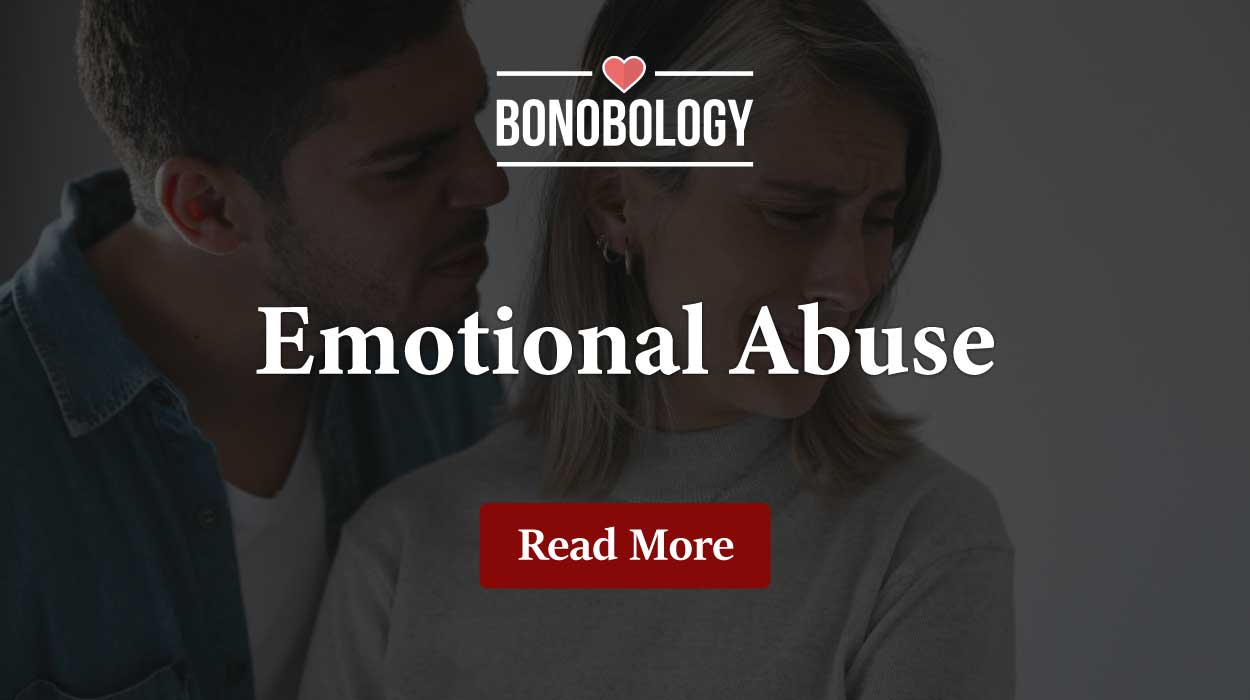
16. Manipulates you
Manipulative behavior is a sign of emotional abuse. You decide on something but they would manipulate you in a way that you would change your decision without even feeling that they have a role to play in it. This is a dangerous sign of a power struggle in relationships.
Manipulation is one of the subtle signs of an emotionally abusive relationship and can be so finely drawn with statements such as, “If you really love me, you would do [insert request here]” or “I’m just looking out for your best interests. Trust me, I know what’s best for you” that you could be giving up everything that you hold dear in your life not for once realizing that you have been actually forced to.
17. Keeps you 10 feet away from their life
A classic sign of emotional abuse is when it comes to your life you cannot do anything without their permission because they have a habit of acting superior. You can meet your friends only when they allow that. They could even insist on coming with you all the time. But when it is their life, you are excluded most of the time.
You don’t know most of their friends, they don’t take you to family parties and you are mostly kept out of their travel plans. They shop on their own, hang out with their colleagues and have a life of which you are not a part in any way.
Related Reading: How To Get Out Of A Controlling Relationship – 8 Ways To Break Free
18. Threats are normal
One of the signs of a relationship full of emotional abuse or a mentally abusive partner is that they make you feel threatened and are constantly accusing you of something or the other. They may use physical violence or verbal threats to scare you, tell you they would harm your pets or children, or even themselves to get you to toe their line. Threatening you is a part and parcel of the ecosystem of fear that they thrive on and leverage to keep you from walking away from the relationship.
19. No concept of privacy
One of the most common tricks in the abuser’s actions playbook is to keep a tab on you by handing over their passwords and smartphone to you and telling you to do the same. You may look at it as a great sign of love and trust but if you are not the nosy kind, you may never go through their emails and phones. However, they would, always, and you would lose your privacy.
This is one of the major relationship red flags that people often condone. People who abuse have no concept of privacy so they would keep stalking you on the phone, email, and social media. They can stalk your every movement giving you no room to be by yourself. You’ll feel watched 24*7 because you are being watched all the time.
20. Very charming to others
One of the major signs of mental or emotional abuse is that your partner could give you hell but they’d be an epitome of charm to other people and never would be a public embarrassment. In the book When I Hit You written by Meena Kadasamy, the abuser in the relationship was such a charming and nice personality that the wife’s own parents would not be convinced of the kind of hell he was capable of the kind of emotionally abusive situation he was able to create for their daughter. So, when you see too much charm, beware.
What to do?
If you are experiencing emotional abuse in an intimate relationship, you may feel confused, scared, or hopeless. But you are not alone, and you can take steps to protect yourself and heal from the abuse. Here are some things you can do if you are emotionally abused:
- Learn to identify the signs of emotional abuse and understand that you are not responsible for the abuser’s actions. Especially when there are subtle signs of an emotionally abusive relationship
- Put yourself first and take care of your physical and mental health by sleeping well, eating healthy, staying active, and doing things that bring you joy
- Reach out to your support network, such as a family member and loved ones or a supportive mental health professional. You can also call a helpline or join a support group of people who have experienced emotional abuse or a group of trained advocates
- Establish limits with the abuser and avoid contact with them as much as possible
- Prepare for your safety and welfare, especially if you choose to end this kind of relationship. You can look for legal help, financial aid, or a secure place to live
- Build up your self-esteem and confidence, which may have been harmed by the abuse. You can use positive statements, challenge negative thoughts, or acquire new skills
- Deal with your feelings and trauma, which may involve anger, sadness, fear, guilt, or shame. You can use healthy ways of coping such as writing, meditating, breathing exercises, self-care or creative outlets
- Recover from the abuse and move forward with your life. You can focus on your aspirations, dreams, and passions. You can also seek professional help to heal your trauma and restore your trust in yourself and others
If you are in immediate danger, call 9-1-1.
For anonymous, confidential help, 24/7, please call the National Domestic Violence Hotline at 1-800-799-7233 (SAFE) or 1-800-787-3224 (TTY).
Key Pointers
- Emotional abuse is a pattern of behaviors where one person harms another person’s mental well-being and ability to function
- A few signs of an emotionally abusive relationship include gaslighting, manipulation, exerting control, withdrawing physical intimacy, the silent treatment, and more
- If you are experiencing emotional abuse, take steps to protect yourself and heal from the abuse
- If you are in a crisis or immediate danger, call 911 right away
If you think these signs look a lot like your relationship, don’t let them slide because it is emotional abuse – talk to someone who can help, maybe a family member or a trusted friend. If the relationship is causing you health problems and/or affecting your work or study, everyday life, and close relationships, it’s not worth holding on to. Talk to someone you trust and find a way to get out of this relationship that is draining you. Relationships should lift you, not weigh you down. Don’t wait for the signs to turn into neon lights before seeking help.
This post was updated in May 2023
FAQs
Changes in behavior include verbal abuse, aggressive tendencies, mood swings, refusing to talk, making threats, stonewalling, or neglecting you to belittle you and make you feel unimportant..
Emotional abuse can leave you completely crippled and heartbroken. You might question your sanity, lose self-esteem and confidence, and in general be scared of relationships.
Your contribution does not constitute a charitable donation. It will allow Bonobology to continue bringing you new and up-to-date information in our pursuit of helping anyone in the world to learn how to do anything.

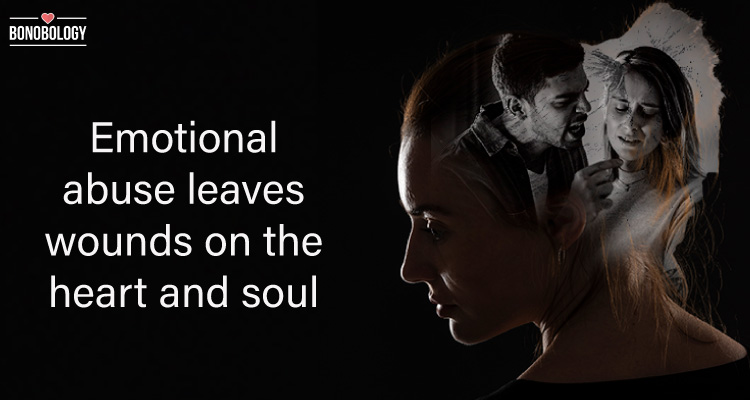

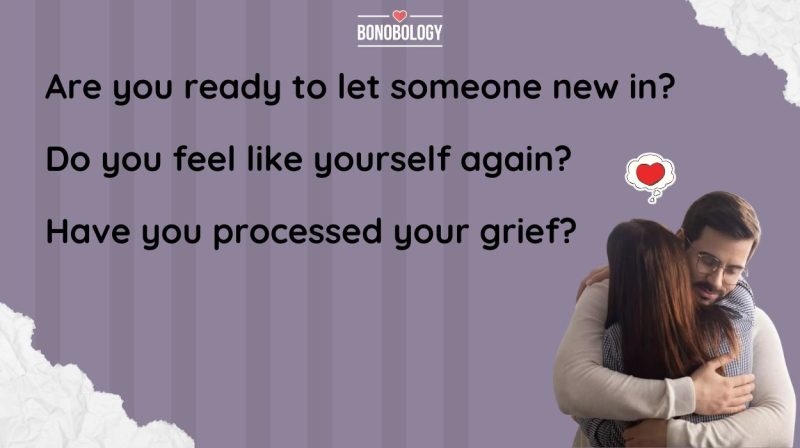
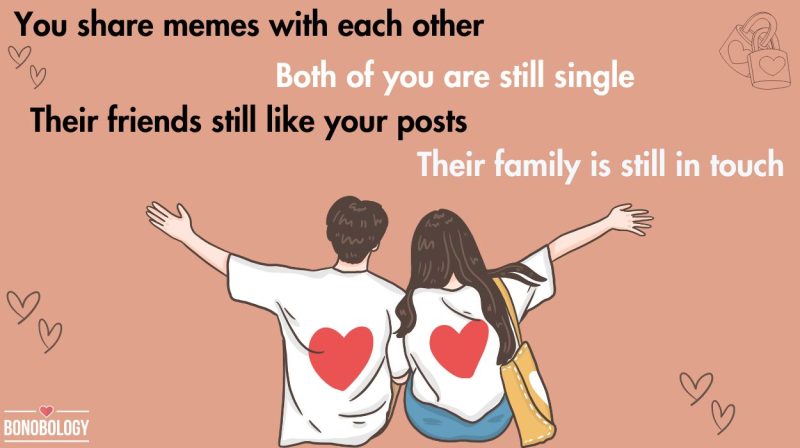














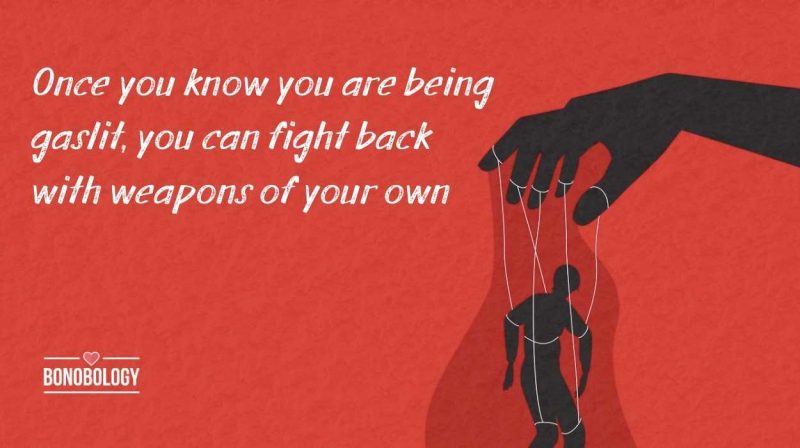
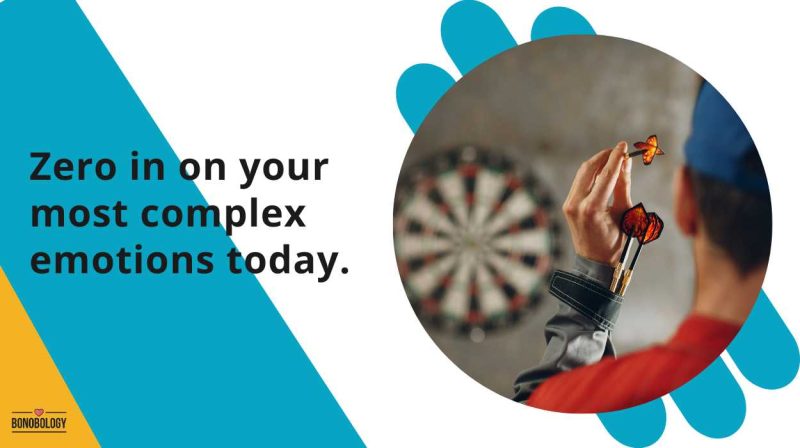


Featured
Am I Moving On Too Quickly After Death Of Spouse—How To Decide
15 Signs You’ll Get Back Together With Your Ex
How To Get Over Trust Issues — A Therapist Shares 9 Tips
Learn How To Forgive Yourself For Hurting Someone You Love
How To Find Peace After Being Cheated On — 9 Tips From A Therapist
How To Forgive A Cheating Husband: 15 Helpful Tips
35 Disturbing Signs Of Gaslighting In A Relationship
What Is Narcissistic Ghosting And How To Respond To It
‘My Husband Starts Fights And Then Blames Me’: Ways To Cope
How To Rebuild Your Life After The Death Of A Spouse: 11 Expert-Backed Tips
My Husband Died And I Want Him Back: Coping With Grief
“Am I Unlovable” – 9 Reasons You Feel This Way
11 Signs Your Girlfriend Was Sexually Abused In The Past And How To Help Her
Coping With Breakups: The Must-Have Breakup Apps For Your Phone
15 Signs You Are Wasting Your Time Trying To Get Your Ex Back
Why Are You Obsessed With Someone You Barely Know — 10 Possible Reasons
33 Phrases To Shut Down Gaslighting And Silence Gaslighters
The Emotion Wheel: What It Is And How To Use It To Build Better Relationships
The Role Of Supportive Relationships In Addiction Recovery
7 Signs You Have A Verbally Abusive Wife And 6 Things You Can Do About It